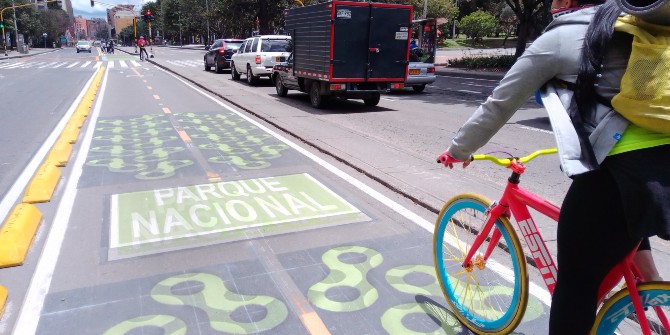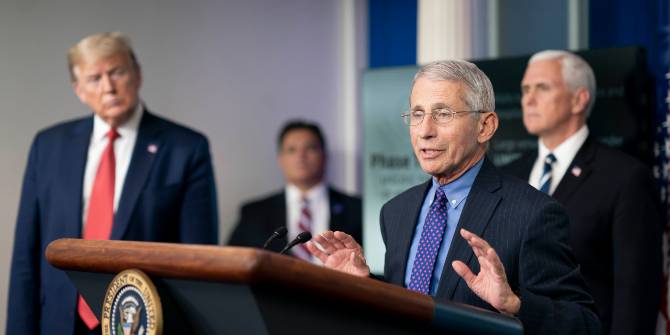What is the future of technocracy, after COVID-19, asks Jonathan White (LSE)? Current crisis management only blurs ever more the boundary between politics and technical expertise, he argues.
“COVID-19 represents a new form of economic shock that cannot be tackled using the textbooks of the past.” So recently observed Christine Lagarde, head of the European Central Bank (ECB). That emergencies throw orthodoxies in the air seems clear; fresh problems demand fresh thinking. But her words also hint at how technocrats define themselves in a crisis. As much as these are the conditions in which expertise is challenged, they are also times of opportunity. Officials can recast themselves as practical, flexible, and independent-minded—possessors of the deeper insight that lies in knowing when to set aside yesterday’s formulas. Crisis moments encourage the transformation of technocracy, and with it the relation to politics.
Twentieth-century history shows how turbulent times can produce calls for expert-led government. Movements for technocracy emerged in 1930s America and Europe in response to the Great Depression, taking inspiration from the rationalism attributed to wartime planning. The kind of expertise they prized was marked by the experience of crisis. Practical in spirit, it was about knowing what works, and how to fix things when they break. Many consciously celebrated the figure of the engineer. The writings of Thorstein Veblen, Howard Scott, and Walter Rautenstrauch in the United States likened society to a machine, calling for government as “social engineering.”
More soberly and influentially, the engineer’s outlook was present in Keynesian economics, emerging with the General Theory in 1936 as the basis of postwar technocracy. Formed in the encounter with mass unemployment, this was macroeconomics as problem solving. In a world assumed to be volatile and swayed by the “animal spirits,” markets never quite worked as they should. The policymaker’s role was to tinker and probe, to keep things working despite stresses, strains, and shocks. Confronted with a complex and changing reality, discretion and judgement were needed, along with the prudence to build in spare capacity for the unexpected.
As the Keynesian consensus passed with the energy crises of the 1970s, a new vision of technocracy emerged, based instead on the ideal of the scientist. For monetarists like Milton Friedman, previous orthodoxy rested on dubious propositions that needed rigorous testing: the economist-engineers had taken too much for granted. More than earlier liberals like Friedrich Hayek (himself a critic of “scientism”), neoliberals developed their ideas on the model of physics. Assuming a basic stability in how the world works—how markets operate, why firms behave as they do—the economist-scientist was to seek general laws of causality, while technocracy was to use standard templates rather than personal judgement and discretion. Both would be a kind of anonymous process, politically invisible and independent. Central banking would be based, ideally, on fixed rules and delegated objectives (e.g. low inflation), while the International Monetary Fund (IMF) and World Bank would develop a Washington Consensus of standardised policies, for which post-communist societies were a convenient laboratory. There was a utopian current in this model of technocracy: rather than manage an imperfect order, the goal was the optimal arrangement.

But what about when things go wrong? Technocracy-as-science suits stable times, when the real world can passably resemble the laboratory. Emergencies disrupt this norm, since actions must be taken quickly, before all the evidence is in. When the Asian financial crisis hit in 1997, a different expertise seemed called for—know-how more than know-that, plus knowing what not to do. Enter the figure of the doctor, and a tendency to liken the newly globalized and financialized economy to an organism struck by pathogens. Faced with “Asian flu,” the role of IMF policymakers was to tackle contagion. On the model of disease control, this approach recognized the reality of degenerative tendencies, while implying most were external to policy itself and not something for which officials were responsible. It also managed expectations. The doctor assumes change and decay. There was now no such thing as a perfect market order: sickness was always possible (implying, of course, that the system was healthy much of the time). In this increasingly uncertain world, the policymaker was licensed to make discretionary interventions and acquired the added role of offering “reassurance” to keep anxieties in check.
In the economic crises of the 2010s, and now most recently with COVID-19, problem solving is more than ever the name of the game. A doctor’s judgment lies in connecting case to known remedy, but this gets harder the more unfamiliar the disease. Today’s economic technocracy is about using all tools in the toolkit—in that sense we are witnessing the return of the engineer. Decision-makers emphasise the need for ingenuity, discretion, and invention, from Mario Draghi’s “whatever it takes to preserve the euro” to Lagarde’s “everything necessary.” Eurozone policy rules are re-described as “self-imposed limits,” revisable to preserve deeper goals of stability. Nobel Prize-winning economists ask us to think of their discipline as “plumbing”—engineering at the sharp end where things can get messy. There is even a note of the theatrical in today’s technocracy: like a good stage performer, Lagarde keeps suspense about measures to come, “because the impact will also be linked to the element of surprise.”
If economic technocracy after COVID-19 continues to move in this direction, there are some reasons to be optimistic. After decades of an outlook based on general propositions about how markets supposedly function, a perspective more conscious of market failure—and sometimes the need to slow down the machine—sounds attractive. Whereas scientific expertise can be excessively specialized, here there is the promise of a more rounded perspective. Greater sensitivity to the particularities of implementation offers a vantage point from which to accept crosscutting claims to social justice. And when it is recognized that the system is only as good as the policies designed into it, accountability has a better foundation. While similar things might have been said a decade ago, the effects of COVID-19 may be more profound than those of 2008, occurring as they do against the backdrop of an existing crisis of Western capitalism.
But there are also notable grounds for caution. There is no reason to suppose crisis technocracy will serve left-wing, even Keynesian, objectives: a willingness to intervene in the face of shocks can serve any number of ends. Moreover, crisis management only blurs ever more the boundary between technocracy and politics. As personal discretion comes to the fore, the notion that technocrats are just enacting a set of delegated tasks becomes untenable—their power is more elastic. One might even question how much expertise is actually present. Scientific knowledge is anchored in replicable methods, but know-how is harder to objectify. More personalized and intuitive, invoked when things are already going wrong, it can be hard to distinguish from arbitrary rule. How do we know who has it? Should this authority not be contested?
When officials distance themselves from “the textbooks of the past,” they redefine their expertise and embrace the flexibility sought in extreme conditions. Crisis decisions may be better for it. But as technocrats go down this path, one may question whether technocracy remains the right standard to apply.
This post represents the views of the author and not those of the COVID-19 blog, nor LSE. It first appeared on the Boston Review.
Jonathan White (@jonathanpjwhite) is Professor of Politics at the LSE. His latest book is Politics of Last Resort: Governing by Emergency in the European Union.





1 Comments